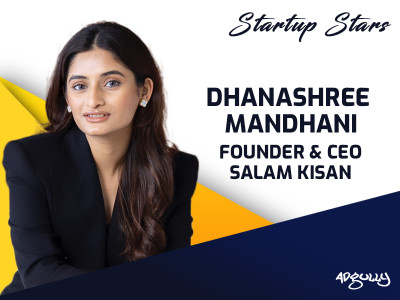How Suta is weaving a sustainable and successful story for sarees
Adgully has been turning the spotlight on the entrepreneurs who fought against all odds to bring their dreams to fruition in our special series – START-UP STARS. We at Adgully wholeheartedly support the ‘Vocal for Local’ movement and have been featuring numerous local/ homegrown businesses, brands, and Apps in the country launched in the last few years.
Sisters, Sujata Biswas and Taniya Biswas founded Suta in 2016. It has now evolved into one of India’s best-loved artisanal brands, known for its forward-thinking designs, impeccable craftsmanship, and dedication to inclusivity. Through its visionary collections and impactful campaigns, Suta aims to inspire and uplift individuals, fostering a more inclusive and accepting world. Suta combines India's centuries-old weaving traditions with contemporary style so that what looks good, feels good too.
While Sujata and Taniya both have a background in business management, they had no experience in the fashion and textile industry. But they knew that when they added value to their customers’ life and created something that was aligned with the market’s needs, their business would grow. Hence, they focused on making the product their strongest forte. They had a clear mind-set of impacting people at the grassroots level, which they communicated effectively to customers and weavers – that became another significant strength for Suta.
In an interaction with Adgully, Sujata Biswas and Taniya Biswas, Co-Founders, Suta, speak about the growth and entrepreneurial journey of Suta, making the saree relevant to GenZ, supporting mindful and sustainable fashion, what budding entrepreneurs should do to set up a successful venture, and much more.
What inspired the founding of your start-up, and what problem did you set out to solve?
Sujata Biswas: Like most people, Taniya (Ta) and I both dove into the corporate pool soon after our education. I am an alumnus of CET Bhubaneshwar and IIFT Delhi, and was engaged with Essar Group, Jindal Group, and IIT Bombay for seven years. Ta holds an engineering degree in ceramics from the National Institute of Technology, Rourkela, and an MBA from IIM, Lucknow. She was associated with IBM as an associate consultant, worked as a production manager at Tata Refractories, and was a marketing consultant with Seed Fund’s investee firm. But both of us were restless in these career paths – we wanted to create something of our own, an enterprise that would have a real, tangible impact on the world we live in.
Interestingly, Suta isn’t our first venture as co-founders. Ta is passionate about photography and we started a photography business together – I was the model and the clothes I wore were our own designs, with the fabric sourced from local vendors and stitched by our neighbour tailor. Over time, we realised that our designs were attracting more attention than our photography service, and we decided to delve deeper into apparel. When brain storming what our first product would be, we thought back to our fondest memories from early childhood, of visiting our ancestral home when we would play in the courtyard where our grandmother’s cotton sarees were hung out to dry. The softness of the fabric and how good it felt had stayed with us. Our father’s transferable job had taken us across the country during our formative years, giving us the invaluable opportunity to learn more about India’s rich textile tradition and the hands that create these fabrics.
We realised that in order to preserve these rich textile traditions, we would have to make them more accessible and find them a place in every wardrobe and every home. Thus, we created our first weave, our Made in Heaven mul that has transformed the way women view sarees – the fabric is so light, figure-flattering and airy that it can be sported with ease as office or casual wear. Our muls became our signature product and they continue to be among our bestsellers to date. The growth of our brand has also enabled us to support a larger community of weavers and offer them a steady source of employment. From starting out with two weavers, in the span of just seven years, we’ve expanded to 17,000. Our sarees have been worn by major celebrities, including Madhuri Dixit and Vidya Balan, and it fills us with pride to how far our dream has come.
Could you provide an overview of your product/ service and its unique features or benefits?
Suta is:
- India’s best loved homegrown lifestyle brand, with a guiding mission to preserve traditional Indian weaves and handicrafts
- A contemporary brand that doesn’t follow but sets trends. Our breakthrough product ‘Made in Heaven Mul’ was a game-changer. It brought the saree back to the daily-wear category, for a large customer segment.
- The only brand with a wide selection of ready-to-wear, perfectly fitted saree blouses.
- A strong brand voice that advocates freedom of self-expression, gender inclusivity and breaking societal stereotypes.
Our products reflect our values such as mindfulness and simplicity, and are inspired by nature, nostalgia and inclusivity. We’re known for our wide price range with a strong focus on affordable, transparent pricing, as well as our consistent, regular new launches that offer fresh yet timeless options to customers.
How does your start-up differentiate itself from competitors in the market?
Drawing on their own learning from the corporate world and their personal shopping experiences, Sujata and Taniya realised that people typically wore sarees on special occasions. These sarees were mostly borrowed and it was difficult to find casual sarees that could be worn on a daily basis. They perceived a market opportunity for contemporary, comfortable and affordable sarees. They also interviewed youngsters and found that many of them perceived wearing sarees as cumbersome due to the additional associated asks, such as stitching the fall and the blouse. So, they came up with the idea of creating a comprehensive solution in the form of a one-stop destination for all saree needs, to make the experience hassle-free.
During its early days, Suta participated in a number of exhibitions across major Indian cities, including Mumbai and Delhi. At most of these exhibitions, all the products would sell out. These exhibitions also provided additional insights into the profiles of Suta customers and confirmed that the Suta woman stood out subtly from the rest, without being too loud in her aesthetic. Simple, minimalistic and comfort-focused designs appealed to her.
When Suta entered the market, it became a pioneer in selling sarees that were perceived as contemporary, and was instrumental in making them an everyday style statement. Although there were other brands that sold sarees at the time, the prices they offered were largely unaffordable to the Gen-Z audience. Suta was the first mover in the affordable saree segment.
What milestones has your company achieved so far, and what are your future growth plans?
Suta was launched in 2016 with only one employee and two weavers. Today, the organisation has grown to encompass more than 200 employees and 17,000 weavers and artisans. We have also branched out into diverse product categories, including kurta sets, dresses, menswear and home décor, and are continually adding to our repertoire. In recent months, we have launched a specific sub-brand named Aador, which specialises in stitched apparel for women. Additional sub-brands dedicated to menswear and children’s wear are also in the pipeline.
As our brand has grown, we’ve made concerted efforts to bring Suta products to customers in various parts of the country, and give them the opportunity to touch, feel and experience the love and labour that goes into each of them. That’s when we began our country-wide Suta Bazaar exhibitions that have travelled across the length and breadth of the country. The heartening response encouraged us to set up physical stores (seven and counting) in Mumbai, Thane, Bengaluru, Hyderabad, Chennai, Kolkata and Bhubaneswar. Going forward, we’ve set ourselves a revenue target of Rs 80 cr. for next fiscal year. We’re also targeting setting up additional retail stores and taking our Suta Bazaar exhibitions to additional cities and towns. Importantly, we want to bring even more weavers, artisans and craftsman on board and ensure they receive regular orders and steady income.
How has the start-up evolved since its inception, and what challenges have you overcome along the way?
At the time of Suta’s inception, the textile and weavers’ market were already widespread. While resources were abundant, the market was highly unorganised. Their challenge was to tap the market and make it more organised, for which, a strong supply chain was essential. Over its initial years, Suta dedicated itself to making the supply chain seamless, which became the company’s strength.
How does your start-up contribute to the industry or community you operate in?
Our brand’s strongest value proposition and its driving vision is to offer our weavers and artisans regular work, so as to prevent their heirloom crafts from obsolescence. Our co-founders have worked long and hard to win our weavers’ trust, by ensuring that they are fairly compensated. At the same time, Suta is perhaps best known for bringing the saree back in circulation as daily wear, by making the garment more functional, easy to wear and style, and transforming the way it is perceived – at Suta, we believe that clothes are natural extensions of their wearers’ beliefs and personalities and, as a blank canvas, the saree becomes the most expressive attire in our wardrobes.
How much funding has the company raised, and from which investors?
Suta is completely bootstrapped. The brand started out with Rs 3 lakh investment from co-founders Sujata and Taniya in 2016.
Who are your target customers, and how are you acquiring them?
Our target customers are independent, earning women between 25 and 40 years of age. To date, word-of-mouth recommendations from existing customers is the most effective way for us to acquire customers. On the marketing front, we use social media ads and digital advertising, while also using our Instagram and Meta pages to reach out organically to customers. Other sources, including newspaper and radio ads, as well as hoardings, as well as our beloved Suta Bazaar exhibitions.
What are the major challenges the company faces currently?
At present, our most pertinent challenges involve acquiring good resources and subject market experts – Suta’s people are our strongest asset. We’re also further working on perfecting our logistics, to make the Suta experience even more seamless.
What is the background and expertise of the founding team?
A sustainability enthusiast, TEDx speaker, and a mother (to her son, dog and plants), Sujata, is an alumnus of CET Bhubaneshwar and IIFT Delhi. She worked for seven years with Essar Group, Jindal Group and IIT Bombay before co-founding Suta with her sister Taniya. To do so, she quit her PhD and dove into the weaver-centric fashion D2C e-commerce industry.
Taniya, who wears several hats as an entrepreneur, TEDx speaker and vocal advocate for mindful fashion, is the co-founder of Suta. She has an engineering degree in ceramics from National Institute of Technology, Rourkela, and an MBA from IIM, Lucknow. Taniya was associated with IBM as a strategy consultant, worked as a production manager at Tata Refractories, and was a marketing consultant with Seed Fund’s investee firm, before co-founding Suta.
Since its inception seven years ago, Suta has grown into an organisation that employs more than 200, engages more than 17,000 weavers and artisans across the country, and has a turnover of Rs 56 crore (Rs 560 million). The sisters have received recognition and appreciation from the media and government bodies alike, for the pivotal role they’ve essayed in reviving India’s artisanal economy and for bringing sarees back into the mainstream as daily and casual wear rather than being reserved only for special occasions. Importantly, Suta is hailed for its dedication to ensuring that the weavers it engages receive fair wages and a sustainable source of income, which allows them to continue practicing their ancestral trade and sustain heirloom weaving practices, without having to move to the cities in search of alternate sources of employment.
How does the company measure success, and what are its key performance indicators (KPIs)?
As a brand, we measure our success through the amount of work we are able to provide our artisans and craftsmen; financials are secondary. Lour KPIs are our conversion rate and the number of new customers we acquire.


















Share
Facebook
YouTube
Tweet
Twitter
LinkedIn